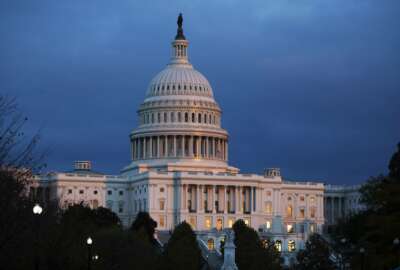
Postal Service reminds employees about rules regarding holiday gifts
In today's Federal Newscast, USPS' Ethics Office wants to remind its employees about the restrictions applied to receiving gifts from customers and vendors.
To listen to the Federal Newscast on your phone or mobile device, subscribe in PodcastOne or Apple Podcasts. The best listening experience on desktop can be found using Chrome, Firefox or Safari.
- Postal Service employees got a reminder about accepting holiday gifts this season. Agency guidelines allow employees to accept coffee, soda, doughnuts, cookies, and other refreshments, as long as they’re not considered part of a meal. However, postal workers cannot accept gifts such as chocolates or cheese platters sent by vendors. The Postal Service’s ethics office has also reminded employees that they can’t accept gifts from customers.
- Congress agreed to a 3.1% pay raise for federal employees next year. It includes a 2.6% across-the-board raise for civilian employees with an additional 0.5% locality adjustment. The proposal is part of the two minibus spending bills lawmakers unveiled Monday. Congress must pass and the president must sign both bills into law by the end of the week to avoid a government shutdown. (Federal News Network)
- The budget deal agreed to in Congress preserves the Defense Department’s ability to shift funds without congressional approval. Lawmakers originally wanted to restrict the amount of funds DoD could move after the Trump administration used military construction and drug interdiction money to build parts of a wall on the U.S.-Mexico border. If the bill is passed, $1.4 billion will go toward the border wall in 2020. (Senate Appropriations Committee)
- The Congressional Budget Office estimates it will cost $3.3 billion over the next five years to give federal workers 12 weeks of paid parental leave. The Federal Employee Paid Leave Act gives government workers paid time off after birthing, adopting or fostering a child. It’s attached to the 2020 National Defense Authorization Act. The cost only takes into account increases from allowing employees to use paid leave in situations where they would use unpaid time off, vacation days or sick days. Some advocates of the bill say the program could save the government $50 million a year in reduced employee turnover costs. (Federal News Network)
- For the last two years, Congress has inserted itself into the acquisition process for DoD’s JEDI Cloud contract. But lawmakers have decided to stay out of the way during this year’s legislative process. Aside from quarterly reporting requirements, the final 2020 spending agreement Congress will vote on this week contains no restrictions on DoD’s controversial cloud contract. The NDAA that’s also headed to the president’s desk leaves JEDI unscathed, too. That’s despite intense lobbying on Capitol Hill — especially on the part of Oracle, which had asked lawmakers to intervene in the procurement for a third straight year. The department and its winning bidder, Microsoft, intend to make the new cloud available to Defense users as soon as February unless those plans are blocked by federal courts.
- Funding to help agencies modernize technology and improve citizen services takes an across-the-board hit in 2020. The House won the battle with the Senate to fund the Technology Modernization Fund, but it cost them. Details of the fiscal 2020 spending bill released Monday show the TMF Board will have $25 million this year to accelerate agency efforts to get off legacy IT. That total is $10 million less than the House Appropriations Committee approved earlier this year and $125 million less than the White House requested. Additionally, OMB’s IT Oversight and Reform fund will receive $15 million, which is about $13 million less than in 2019 and $3 million less than the White House requested. GSA’s Federal Citizen Services Fund will get $55 million, which is a cut of $5 million over 2019 and the administration’s request.
- The 2019 Best Places to Work in Federal Government rankings came out Tuesday. New analysis from the Partnership for Public Service and Boston Consulting Group show a small dip in employee engagement over the past year. Both NASA and the Department of Health and Human Services topped the rankings once again. These agencies also managed to improve their scores. Several agencies facing relocation or reorganization suffered in this year’s rankings. Several components at the Office of Personnel Management saw double-digits drops. Engagement scores at the two Agriculture research bureaus that moved to Kansas City also saw nosedives in 2019. (Federal News Network)
- Vendors who violate the False Claims Act or doctors who commit certain types of fraud against Medicare or Medicaid will pay more in fines in 2020. The Office of Management and Budget is adjusting the amount of civil monetary penalties by the Consumer Price Index. The rate increases 1.01% starting after Jan.15. The Federal Civil Penalties Inflation Adjustment Improvements Act of 2015 requires OMB to adjust the civil penalties based on the rate of inflation. (White House)
- The Department of Veterans Affairs has yet to fix a financial flaw that produces a deficiency in its annual audit statements. The Veterans Health Administration orders items it never receives, to the tune of $3.5 billion a year. Inspector general auditors found that VHA failed to de-obligate $133 million worth of undelivered orders. If not de-obligated in their current fiscal year, the dollars go back to the Treasury Department instead going elsewhere to help veterans. The IG recommended the chief financial and chief procurement officers get together to fix the problem. (Department of Veterans Affairs Office of Inspector General)
Copyright © 2024 Federal News Network. All rights reserved. This website is not intended for users located within the European Economic Area.
Eric White
Eric White is news anchor and Federal Drive producer at Federal News Network.
Follow @FEDERALNEWSCAST
Related Stories
GAO’s report on the Technology Modernization Fund puts OMB on the offensive
Related Topics
2020 NDAA
All News
border wall
defense spending
ethics guidance
False Claims Act
Federal Drive
Federal Newscast
federal pay raise
JEDI
NDAA
Office of Personnel Management
paid parental leave
Pay
Pay & Benefits
Postal Service
technology modernization fund
Veterans Health Administration
Workforce
Workforce Rights/Governance




